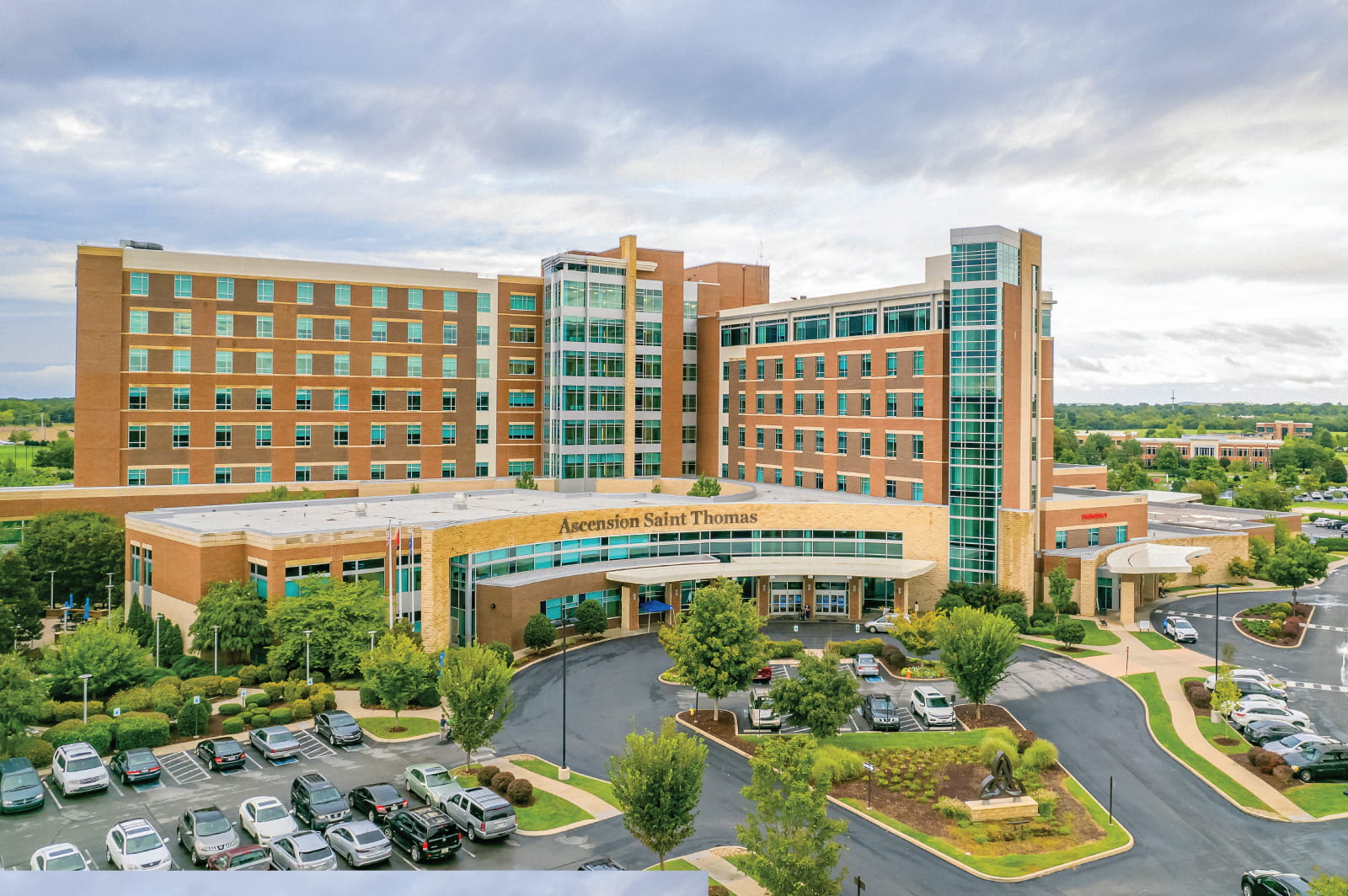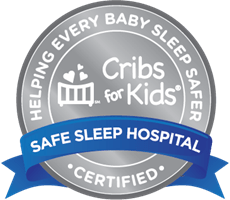
Ascension Saint Thomas Rutherford - Birthing Center
What type of appointment would you like to book?
About Us
-
How do I find an OB-GYN that's right for me?
Choosing an OB-GYN is personal. You want a doctorwho is experienced and who you feel comfortable talking with. Our OB-GYNs listen to understand your preferences and are always ready to answer your questions, no matter how big or small. Find an OB-GYN.
-
What weeks do you get an ultrasound while pregnant?
When you get ultrasounds and how many you have while pregnant depends on many factors. Your doctor will work with you to determine when you need to come in for ultrasounds. Typically, the first fetal ultrasound (sometimes called a sonogram, or the image made by the ultrasound) is done in the first trimester to confirm the pregnancy and estimate how long you have been pregnant. During most pregnancies, the second ultrasound is typically done in the second trimester (around 18 to 20 weeks). During this ultrasound, your doctor looks for any concerns and may be able to confirm your baby’s sex. In some situations, such as during high-risk pregnancy, your doctor may recommend ultrasounds during the third trimester to monitor your baby's health. These ultrasounds may be every other week, weekly or more often.
-
What if I have vaginal bleeding during my pregnancy?
Light bleeding or spotting are common during early pregnancy and don’t always mean there is a problem. But you should contact your doctor as soon as you notice spotting, bleeding or other symptoms to determine if you should be concerned or if your doctor needs to see you.
-
Can I exercise while pregnant
About 30 minutes a day of light to moderate exercise is recommended for most women during pregnancy. These include exercises such as walking, swimming, yoga and strength training. But it is important to talk with your doctor about what activities are right for you during your pregnancy.
-
What should I do if I get a UTI while pregnant
During pregnancy, changes in hormones can increase your risk of having a urinary tract infection (UTI). If you have symptoms of a UTI while pregnant, get care right away to avoid serious health concerns, such as kidney infection. Contact your doctor if you experience symptoms such as:
- Pain or a burning feeling while urinating
- Urinating more often
- Feeling the urgent need to urinate
- Blood in your urine
- Pressure or cramping in lower back or abdomen
-
What happens if I get high blood pressure during pregnancy?
Sometimes, high blood pressure develops during pregnancy. Having high blood pressure during pregnancy is a serious condition that can put you and your baby at risk. Untreated high blood pressure can lead to less blood flow to the placenta, injury to other organs, and premature delivery. If you have high blood pressure while pregnant, we will create a care plan that helps control your blood pressure. And we continue to closely monitor your health and your baby’s health throughout your pregnancy.
-
How much weight should I gain during pregnancy?
Each woman and pregnancy is different. How much weight you gain during pregnancy depends on many factors, including how much you weighed before becoming pregnant and if you are having one or multiple babies. Typical weight gain for a woman of healthy weight, having one baby, is 25-35 pounds. If you have questions or concerns about weight gain during your pregnancy, talk with your doctor.
-
Is there a way to take a tour of the birthing center
Yes, we offer in-person tours and virtual tours that you can watch online for most of our birthing centers. You can schedule an in-person tour or click on the link below to take a virtual tour.
- Ascension Saint Thomas Hospital Midtown
- Ascension Saint Thomas Hospital Rutherford
- Ascension Saint Thomas Hospital River Park
You can also schedule an appointment with a birth designer. Your birth designer at Ascension Saint Thomas helps you understand your choices and decide on your preferences to personalize your birth experience. Request an appointment.
-
How do I register for parent birthing classes?
Having a baby is an exciting time, but there is also a lot to learn. And the more you know, the better prepared you will be for these new experiences. At Ascension Saint Thomas, we offer many classes for expecting moms and parents – from birthing to breastfeeding classes. You can view available classes and sign up online here.
-
Who do I call if I get sick while pregnant?
If you are feeling sick while pregnant, call your OB-GYN or certified nurse-midwife. Your provider will work with you to create a care plan that’s right for you and your baby. If you are experiencing a life-threatening emergency, go directly to the ER or dial 911.
-
What over-the-counter medications can I take while pregnant?
Talk with your doctor before taking any over-the-counter medications at any time during your pregnancy or while breastfeeding. Typically, there are over-the-counter medication options you can take for allergies, constipation, and colds.
-
What is postpartum depression? What are the signs and symptoms?
Many women experience the “baby blues” after having a baby. Baby blues can begin a few days after birth. But some moms experience a more severe form of depression called postpartum depression. Postpartum depression is a mood disorder that occurs after having a baby. Feelings of postpartum depression are more intense and last longer than those of “baby blues.” Symptoms include:
- Crying more than usual
- Feelings of anger
- Withdrawing from loved ones
- Feeling distant from your baby
- Worrying or feeling overly anxious
- Thoughts about hurting yourself or your baby
- Doubting your ability to care for your baby
If you are feeling depressed after having a baby, talk to your doctor. You are not alone. Many new moms experience postpartum depression. When you feel depressed for more than a few days, start by talking with your doctor. There are many things we can do to help you – from relaxation techniques and support groups to therapy and medication.
If you are having thoughts of harming yourself or your baby, get help right away. Call 911 so that you and your baby can get help as soon as possible.
-
What should I do to help prevent infections after C-section and vaginal delivery?
Preventing bacterial infection after the delivery of your baby is important for your overall health. Postpartum infections are not common, but can occur in your perineum, uterus, and/or urinary tract. A few tips to help prevent infection after delivery include:
- Wash your hands frequently
- Don’t use a vaginal douche
- Keep incision sites clean
- Use sanitary pads instead of tampons during the first six weeks
- Don’t have intercourse until you’ve been cleared by your doctor
- Stay well hydrated
- Urinate frequently
Symptoms of an infection include: pain that gets worse over time, fever, chills, weakness, headache, foul-smelling discharge, as well as swelling, redness and/or discharge around the incision site (for C-section deliveries). If you are having symptoms of an infection, call your doctor right away. If your symptoms are severe, call 911 or go to the nearest ER. It’s important to get treatment as soon as possible.
-
What activities are safe to do in the first few days after delivering my baby? Which activities should I avoid?
There are many benefits to being active after pregnancy. Physical activity can help relieve stress, boost energy levels, promote weight loss and reduce symptoms of postpartum depression. The amount and type of activity you can do depends on the type of delivery you had and your health. Typically, light activity is OK to start a few days after delivery. This includes walking and some gentle pelvic floor exercises. Talk with your doctor about what activities are safe for you after delivery before you start exercising.
And remember to listen to your body. Your body is healing and adjusting to a new lifestyle with a baby. So, if you’re feeling tired or you are in pain, you may need to let your body rest.
Some activities to avoid in the first few weeks after delivery include swimming, running, heavy lifting and high-intensity workouts. Talk to your doctor at your six-week post-delivery checkup or before about doing any of these or other more intense activities.


